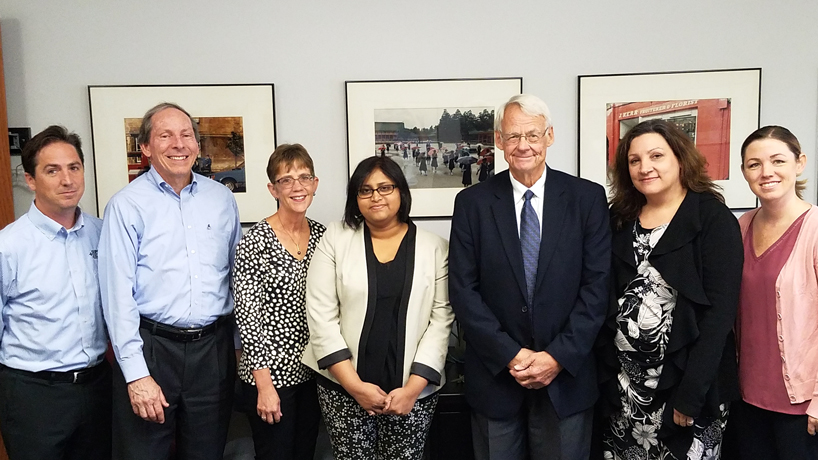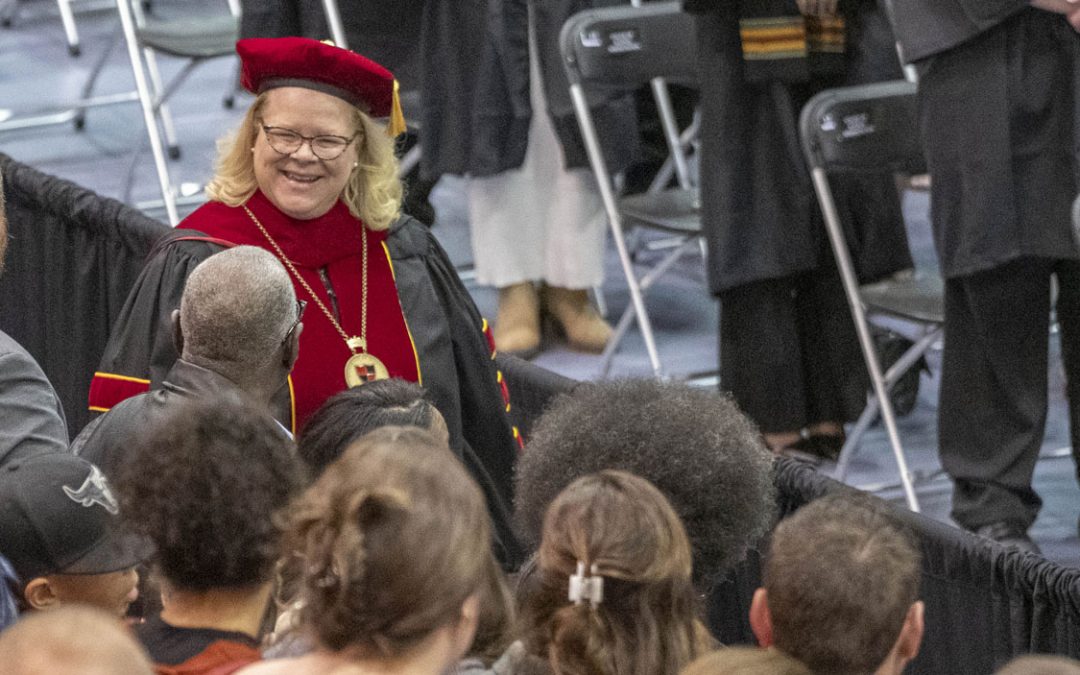
PhD in Business Administration graduate Parimal Kulkarni (center) had a strong showing during her oral defense on Sept. 28 in Express Scripts Hall. Her supporters included (from left) BJC Director of Analytics David Trani, Strategic Manager of Supply Chain Analytics Curt Grassi, retired Vice President of Supply Chain Transformation Nancy LeMaster, Professor of Management Science Douglas Smith, Manager of Supply Chain Analytics Emily Wilson and Manager of Supply Chain Analytics Jennifer Kempf. (Photo courtesy of James Campbell)
When Parimal Kulkarni entered Express Scripts Hall on Sept. 28, she knew she was about to embark on one of the most nerve-wracking afternoons of her life.
She had worked toward this moment since 2011, so a combination of anxiety and excitement pulsed through her. But when the PhD student began her oral defense and looked around the room – meeting the supportive gaze of former colleagues – Kulkarni’s disposition changed.
“Defending my dissertation was a pretty incredible experience because I was able to invite my mentor and managers from BJC as well as a couple of my colleagues,” Kulkarni said. “It was very difficult not to be emotional right then and there to see that they had taken a few hours out of their day to come to campus, to sit through this and be engaged. It made me feel so supported. When people leave jobs it can sometimes be on such bitter notes. You don’t necessarily have that continued contact with your colleagues. I was lucky that wasn’t the case with me.”
Five months before her dissertation defense at the University of Missouri–St. Louis, Kulkarni relocated to Vancouver, British Columbia, leaving a managerial position at BJC HealthCare, where she had spent six years on the supply chain team. Despite the separation, a team of five showed up in support of Kulkarni’s research.
“I think the turnout was a testimony to Parimal’s ability to build relationships,” said Nancy LeMaster, who served as Kulkarni’s dissertation mentor at BJC. “She was committed to helping the BJC team achieve its goals, and they appreciated her contributions. We all wanted to see her be successful, and it was wonderful UMSL invited us to be a part of her dissertation defense. I was very impressed by the work the faculty did to link the academic aspects of a dissertation with solving real-world challenges. Everyone who participated in the process learned something along the way.”
Kulkarni’s dissertation research focused on designing a procurement model for expensive medical supplies, and she used her experiences at BJC to guide the optimization model. While her work investigated issues unique to health-care supply chain, Kulkarni only became interested in this sector after building a connection with BJC.
When she originally started in the College of Business Administration program, Kulkarni was curious about business analytics and wanted to build on the supply chain knowledge she acquired while completing a master’s in manufacturing engineering program at Missouri University of Science and Technology. She began studying at UMSL full time in 2011, balancing work in the Center for Transportation Studies and as a teaching assistant.
But then her advisor, Professor of Management Science Douglas Smith, connected her to an opening at BJC. She was always interested in the practical applications of research, so she began working as an intern and continued to go to school full time. When a permanent position opened up, BJC offered her the opportunity, but she wasn’t sure how the additional work would influence her studies.
Luckily, UMSL provided her with the option to study part time, opening a pathway for her new passion in health care.
“UMSL is the only school I know of that allows students to continue working on a doctoral degree part time,” Kulkarni said. “That was incredibly helpful because my work eventually became the area of focus for my dissertation. The business problem, the data, all of it came from BJC. It ended up being a really fantastic engagement. I’m really thankful for how engaged UMSL is with industry partners. It was just incredible to see that interaction between academia and industry.”
LeMaster, who served as BJC’s vice president of supply chain transformation before retiring in 2017, said the partnership was equally beneficial to the BJC team.
“Her research benefitted BJC in the way it challenged us to think about how we could use statistical concepts to evaluate risk,” LeMaster said. “She helped us see that these types of tools have practical application and aren’t just academic exercises. Her insights and abilities strengthened the analytics team. I think she learned a lot about operations, and they learned different approaches to analyzing situations and how to move beyond explaining what had happened to looking at how to predict the future.”
Today, Kulkarni uses the knowledge she gained at UMSL and BJC in her new role as a senior advisor of data analytics for Providence Health Care. She hopes this position will lead to her ultimate goal of working in health-care administration.
“One of the reasons I transitioned to a more clinical and administrative area of health care is that I want to position myself to grow into leadership roles that require a solid understanding of health care,” she said. “Not just the analytics, not just the supply chain, but the business of health care. I want to be part of the process when we decide on the type of care patients receive, how different care models are designed and how financial decisions affect those care models. It doesn’t matter which country’s health-care model you’re looking at, there are always challenges, there are always opportunities for improvement.”














